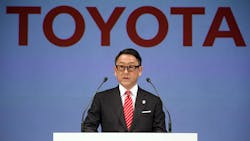Toyota Deepens Panasonic Battery Ties in Electric Car Rush
Toyota Motor Corp. deepened a partnership with battery producer Panasonic Corp. as Asia’s biggest carmaker — which initially bet big on hydrogen for clean technology — accelerates efforts to make its presence felt in electric cars.
The largest supplier of electric-car batteries and Toyota together are exploring the development of prismatic cells, and the collaboration will include solid-state batteries, the two companies said at a news conference in Tokyo on Wednesday. The agreement builds on a joint venture Toyota and Panasonic have had for more than two decades.
As global rivals from Volkswagen AG to General Motors Co. spend billions of dollars to shape the future of electric cars, Toyota is on a mission to make up for the delay. President Akio Toyoda, the 61-year-old grandson of founder Kiichiro Toyoda, has acknowledged that Toyota has been a “a little bit late” on EVs, with governments around the world cracking down on pollution caused by fossil fuels.
“Electrification is a major part of the once-a-century transformation taking place in the auto industry now,” Toyoda told reporters in Tokyo. “In order to make ever-better cars, we need to collaborate with a specialized battery manufacturer.” The safety of EV batteries is a “pressing issue,” he added.
The carmaker is open to other companies joining the partnership to speed the pace of development, he said.
Toyota has been playing catch-up to develop electric cars amid a boom this year, after initially betting on hydrogen to power the zero-emission vehicles. The company launched a venture with Mazda Motor Corp. and affiliate-supplier Denso Corp. in September for EV parts across a spectrum of models. Toyota plans to introduce electric models by 2020 in China and India, where it’s partnering with Suzuki Motor Corp.
While Nissan Motor Co. has sold some 300,000 of the all-electric Leaf since 2010 and Tesla Inc. has delivered more than 250,000 EVs since the first Roadster rolled out in 2008, neither Toyota, Mazda nor Suzuki offer battery-powered passenger cars.
Toyota aims to have an electric component in 50% of all its vehicle sales by 2030, including hybrid cars, Toyoda said. The company wants to increase hybrid sales to 4.5 million by 2030.
It has also been pouring resources into the development of a solid-state battery that it aims to have in electric vehicles by the early 2020s. Solid-state batteries promise to offer shorter charging times and longer driving ranges as well as being safer than the current generation of lithium-ion cells.
Joint Venture
Panasonic provides lithium-ion cells for Toyota models including the plug-in Prius. Panasonic and Toyota have had a joint venture since 1996 called Primearth EV Energy Co., which makes lithium-ion and nickel-metal hydride batteries for other Toyota cars. Toyota controls 80.5% of the entity, with Panasonic owning the remainder.
The Osaka-based electronics maker is also the exclusive battery supplier for Tesla’s current production models, and partnered with the Silicon Valley company to build its $5 billion gigafactory in Nevada.
Bloomberg New Energy Finance sees EV sales surpassing 1 million units this year for the first time, as charging infrastructure becomes more accessible and manufacturers produce models with longer driving ranges. Battery prices have plummeted almost 80% since 2010, and will drop by more than half again by 2026, bringing electric cars to price parity with their gasoline-burning cousins, BNEF predicts.
By Kevin Buckland and Hideki Sagiike, with assistance from Pavel Alpeyev.
About the Author
Bloomberg
Licensed content from Bloomberg, copyright 2016.
